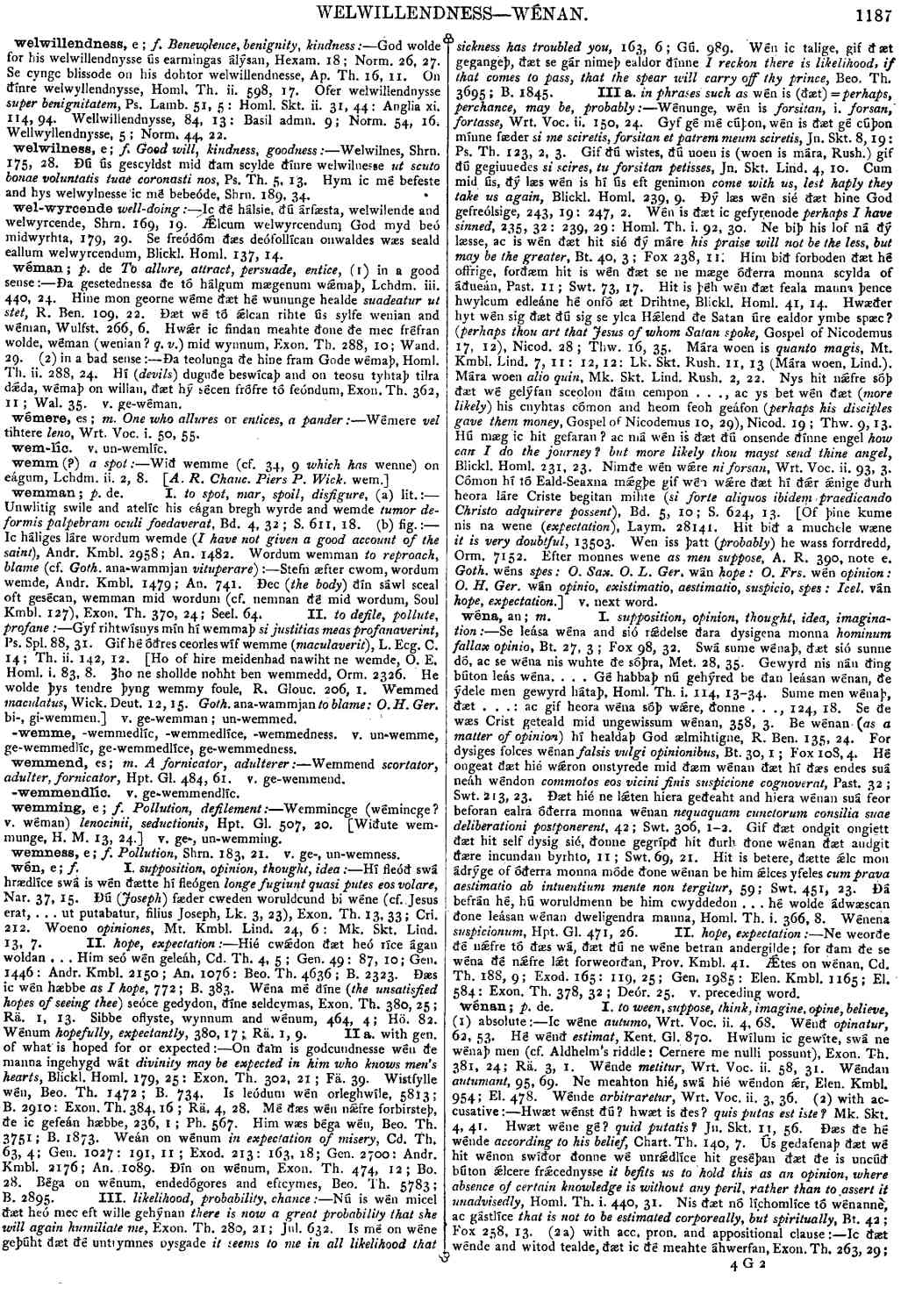wén
- noun [ feminine ]
-
Hí fleóð swá hrædlíce swá is wén ðætte hí fleógen
longe fugiunt quasi putes eos volare,
- Nar. 37, 15.
-
Ðú (
Joseph
) fæder cweden woruldcund bi wéne (cf. Jesus erat, . . . ut putabatur, filius- Joseph, Lk. 3, 23), Exon. Th. 13, 33; Cri. 212.
-
Woeno
opiniones,
- Mt. Kmbl. Lind. 24, 6: Mk. Skt. Lind. 13, 7.
-
Hié cwǽdon ðæt heó ríce ágan woldan . . . Him seó wén geleáh,
- Cd. Th. 4, 5; Gen. 49: 87, 10; Gen. 1446: Andr. Kmbl. 2150; An. 1076: Beo. Th. 4636; B. 2323.
-
Ðæs ic wén hæbbe
as I hope,
- 772; B. 383.
-
Wéna mé ðíne (
the unsatisfied hopes of seeing thee
) seóce gedydon, ðíne seldcymas,- Exon. Th. 380, 25; Rä. 1, 13.
-
Sibbe oflyste, wynnum and wénum,
- 464, 4; Hö. 82.
-
Wénum hopefully, expectantly, 380, 17; Rä. 1, 9. II a. with gen. of what is hoped for or expected :-- On ðam is godcundnesse wén ðe manna ingehygd wát
divinity may be expected in him who knows men's hearts,
- Blickl. Homl. 179, 25: Exon. Th. 302, 21; Fä. 39.
-
Wistfylle wén,
- Beo. Th. 1472; B. 734.
-
Is leódum wén orleghwíle,
- 5813; B. 2910: Exon. Th. 384, 16; Rä. 4, 28.
-
Mé ðæs wén nǽfre forbirsteþ, ðe ic gefeán hæbbe,
- 236, 1; Ph. 567.
-
Him wæs béga wén,
- Beo. Th. 3751; B. 1873.
-
Weán on wénum
in expectation of misery,
- Cd. Th. 63, 4; Gen. 1027: 191, 11; Exod. 213: 163, 18; Gen. 2700: Andr. Kmbl. 2176; An. 1089.
-
Ðín on wénum,
- Exon. Th. 474, 12; Bo. 28.
-
Béga on wénum, endedógores and eftcymes,
- Beo. Th. 5783; B. 2895.
-
Nú is wén micel ðæt heó mec eft wille gehýnan
there is now a great probability that she will again humiliate me,
- Exon. Th. 280, 21; Jul. 632.
-
Is mé on wéne geþúht ðæt ðé untrymnes bysgade
it seems to me in all likelihood that sickness has troubled you,
- 163, 6; Gú. 989.
-
Wén ic talige, gif ð æt gegangéþ, ðæt se gár nimeþ ealdor ðínne
I reckon there is likelihood, if that comes to pass, that the spear will carry off thy prince, Beo. Th. 3695; B. 1845. III a. in phrases such as wén is (ðæt) = perhaps, perchance, may be, probably :-- Wénunge, wén is forsitan, i. forsan, fortasse,
- Wrt. Voc. ii. 150, 24.
-
Gyf gé mé cúþon, wén is ðæt gé cúþon mínne fæder
si me sciretis, forsitan et patrem meum sciretis,
- Jn. Skt. 8, 19: Ps. Th. 123, 2, 3.
-
Gif ðú wistes, ðú uoen is (woen is mára, Rush.) gif ðú gegiuuedes
si scires, tu forsitan petisses,
- Jn. Skt. Lind. 4, 10.
-
Cum mid ús, ðý læs wén is hí ús eft genimon
come with us, lest haply they take us again,
- Blickl. Homl. 239, 9.
-
Ðý læs wén sié ðæt hine God gefreólsige,
- 243, 19: 247, 2.
-
Wén is ðæt ic gefyrenode
perhaps I have sinned,
- 235, 32: 239, 29: Homl. Th. i. 92, 30.
-
Ne biþ his lof ná ðý læsse, ac is wén ðæt hit sié ðý máre
his praise will not be the less, but may be the greater,
- Bt. 40, 3; Fox 238, 11.
-
Him bið forboden ðæt hé offrige, forðæm hit is wén ðæt se ne mæge óðerra monna scylda of áðueán,
- Past. 11; Swt. 73, 17.
-
Hit is þéh wén ðæt feala manna þence hwylcum edleáne hé onfó æt Drihtne,
- Blickl. Homl. 41, 14.
-
Hwæðer hyt wén sig ðæt ðú sig se ylca Hǽlend ðe Satan úre ealdor ymbe spæc? (
perhaps thou art that Jesus of whom Satan spoke,
Gospel of Nicodemus- 17, 12), Nicod. 28; Thw. 16, 35.
-
Mára woen is quanto magis, Mt. Kmbl. Lind. 7, 11: 12, 12: Lk. Skt. Rush. 11, 13 (Mára woen, Lind.). Mára woen
alio quin,
- Mk. Skt. Lind. Rush. 2, 22.
-
Nys hit nǽfre sóþ ðæt wé gelýfan sceolon ðám cempon . . ., ac ys bet wén ðæt (more likely) his cnyhtas cómon and heom feoh geáfon (
perhaps his disciples gave them money,
Gospel of Nicodemus- 10, 29), Nicod. 19; Thw. 9, 13.
-
Hú mæg ic hit gefaran? ac má wén is ðæt ðú onsende ðínne engel
how can I do the journey? but more likely thou mayst send thine angel,
- Blickl. Homl. 231, 23.
-
Nimðe wén wǽre
ni forsan,
- Wrt. Voc. ii. 93, 3.
-
Cómon hí tó Eald-Seaxna mǽgþe gif wén wǽre ðæt hí ðǽr ǽnige ðurh heora láre Criste begitan mihte (
si forte aliquos ibidem praedicando Christo adquirere possent
),- Bd. 5, 10; S. 624, 13.
Bosworth, Joseph. “wén.” In An Anglo-Saxon Dictionary Online, edited by Thomas Northcote Toller, Christ Sean, and Ondřej Tichy. Prague: Faculty of Arts, Charles University, 2014. https://bosworthtoller.com/35062.
Checked: 0